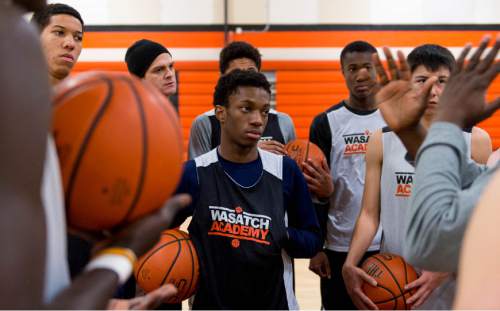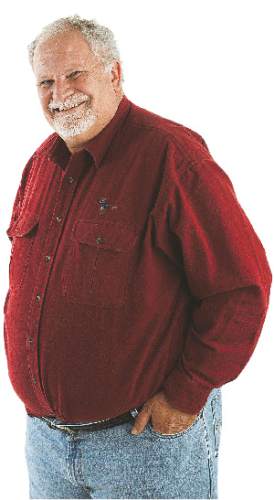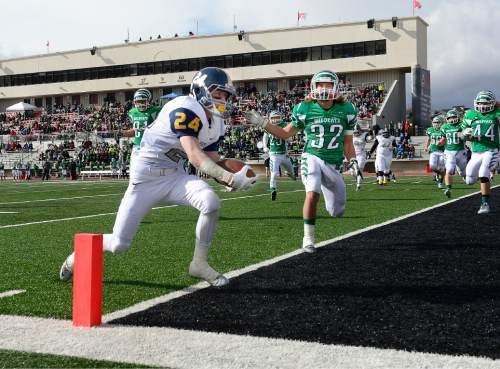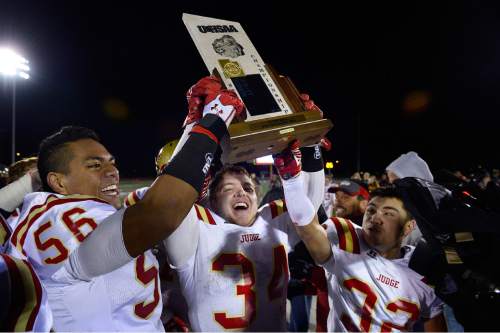This is an archived article that was published on sltrib.com in 2015, and information in the article may be outdated. It is provided only for personal research purposes and may not be reprinted.
The fact that two private schools and a charter institution played for small-school Utah state football state championships this season shows = how much the prep landscape is changing.
Classifications such as 3A, 2A and 1A were once mainly the purview of small-town schools. Most of the competing teams drew players from a relatively tiny pool of players. Some waited years to enjoy some success at state.
This season, Salt Lake City-based Judge Memorial, a Catholic private school, easily beat Juab for the 3A title. South Summit managed to defeat Summit Academy, a Bluffdale charter school with open enrollment, for the 2A crown. And Rich beat Diamond Academy, a private and expensive boarding school in Hurricane with a roster of players from all over the country, for the 1A title.
It's obvious that private and charter schools are having more and more of an impact on Utah prep sports.
In the newest alignment, there are 21 private and charter schools participating in sports, with 17 of them in Class 2A and 1A. Ten of the 24 institutions in 2A and nine of the 33 Class 1A schools with sports programs also are private or charter.
Though open enrollment has made de facto recruiting a fact of life at public schools along the Wasatch Front, schools from the smaller towns don't have that luxury. The growth in private and charter schools could put them at a disadvantage.
Take, for example, Juab's football team this season.
The Wasps have never won a state gridiron title. This, however, was one of those special classes a town such as Nephi dreams about for years.
Alas, as good as the Wasps and quarterback Nick Robins were, they were no match for Judge Memorial. The big-city private Catholic school led 63-0 at the end of three quarters in a total mismatch.
Naturally, there was more than a little grumbling coming out of Nephi about Judge having an unfair advantage because it can draw from the entire Wasatch Front.
Similar sentiments were leveled at Wasatch Academy, a private boarding school located in Mt. Pleasant, the past two years when the Tiger boys' basketball team made up of players from all over the world were never seriously challenged by a public 2A squad.
Judge and Wasatch Academy both earned much respect from the smaller schools by how they reacted to this.
Judge, which is solidly a 3A school if only enrollment numbers are taken into account, successfully petitioned the Utah High School Activities Association to move to 3AA in football and remain 4A in all other sports.
Wasatch Academy applied for independent status for its fine boys' basketball team and will not compete for a Utah state title. Instead, the Tigers are playing in prestigious tournaments throughout the U.S. this season.
Judge's move would have created a traditional small-town Class 3A in football, but that was negated because Juan Diego, Salt Lake County's other large Catholic school, elected to move from 3AA to 3A in football, where it will likely dominate and create some of the same complaints.
Juan Diego's move seemed surprising on another front as well. Had the Soaring Eagle stayed in 3AA for football, where they have competed well, it would have created a great rivalry between Utah's two largest Catholic schools. As it is, the two schools have not been playing each other in football, even in the preseason. Understanding why is difficult.
With Judge winning two straight 3A football titles, Wasatch Academy taking two 2A basketball championships, and St. Joseph's girls winning basketball crowns in 2012 and 2013, the traditional small-town nature of the smaller classifications looks to be challenged.
There was little discussion about the impact of private and charter schools during realignment for the 2015-17 school years. But if these schools start dominating the smaller classifications — and they have the potential to do just that — expect increased grumbling from small-town parents, coaches and fans who don't think the playing field is level.









